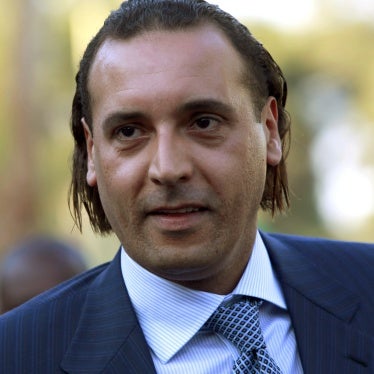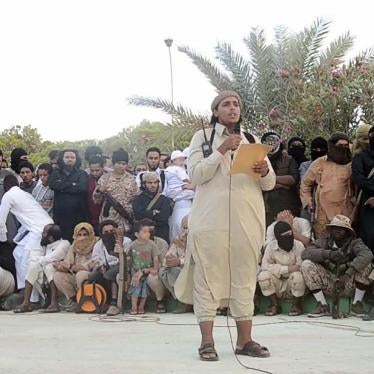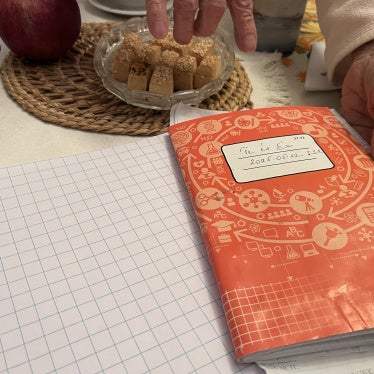Lebanon's government should order an independent investigation into the deaths of two inmates and injuries to about 45 others on April 6, 2011, in Lebanon's main prison, Human Rights Watch said today. The two died during a raid at Roumieh prison by the Internal Security Forces (ISF) and an elite unit of the Lebanese Army to end a four-day riot by inmates demanding better conditions and shorter waits for their trials.
After the raid, Interior Minister Ziad Baroud asked the ISF chief, Maj. Gen. Ashraf Rifi, to open an inquiry into the two inmates' deaths, saying, "There will be a detailed probe and drastic measures." An earlier internal investigation into ill-treatment and corruption at Roumieh prison, in late 2008, was never made public by the Interior Ministry and it is unclear whether anyone was charged. Human Rights Watch urged the government to adopt measures promptly to address Lebanon's entrenched prison problems.
"An internal inquiry into the Roumieh prison deaths will not be sufficient," said Nadim Houry, Beirut director at Human Rights Watch. "Lebanon has a habit of promising investigations that we never hear about again. For this investigation to be credible, it needs to be independent and transparent and report publicly on its findings."
The riot started on April 2 in Block D of the prison and quickly spread to Roumieh's three other buildings, as inmates set mattresses on fire, temporarily took three prison guards hostage, and took control inside the facility, security officials told the media. Negotiations with the prisoners failed, and security forces on April 5 decided to carry out the raid that ended the riot on April 6.
An ISF statement on April 6 stated that "security forces had not used live ammunition during the operation." Human Rights Watch does not have any information to contradict this assertion. A security official who spoke to Human Rights Watch on condition of anonymity said that the security forces only used rubber bullets, stun grenades, and teargas canisters. The security forces statement said that Roy Azar, a 40-year-old prisoner, died after picking up a stun grenade hurled by security forces, which then exploded in his hand. The statement said that Jamil Abu`Anni, 27, died after the raid from a heart attack. Abu `Anni's brother told Human Rights Watch that his brother had diabetes and had died because prison officials denied him his insulin.
Father Hadi Aya, who heads Association Justice et Misericorde, a nongovernmental organization that delivers extensive services inside Roumieh prison, said that 45 prisoners were wounded during the raid, 10 of whom were treated on the spot and 35 who were transferred to hospitals for treatment, many for rubber-bullet wounds. The security forces statement mentioned 14 injured prisoners and 5 injured members of the security forces.
"The Roumieh prison riot shows the need for the government to tackle the underlying problems of overcrowding and lengthy pretrial detentions that make Lebanon's jails ripe for erupting at any moment," Houry said.
According to a statement by the interior minister on April 5, Roumieh prison was built to hold 1,500 inmates and currently holds 3,700. Of those, only 721 have been tried and convicted. Those awaiting trial number 2,757, and 222 are foreigners who finished serving their sentence but are still waiting to be repatriated. According to a 2010 report by the Lebanese Center for Human Rights, a local nongovernmental organization known by its French initials, CLDH, more than 50 percent of those in pretrial detention spend more than six months in jail.
Following the end of the riot on April 6 the caretaker prime minister, Saad Hariri, met with the justice and interior ministers as well as judicial officials to release plans to improve conditions in prisons across Lebanon, including building two new prisons, one in the northern part of the country and the other in the South.
Human Rights Watch urged Lebanon's government to adhere to the United Nations Standard Minimum Rules for the Treatment of Prisoners and other international standards.
"The answer to Lebanon's prison problems is not simply to build new prisons," Houry said. "As long as prisoners languish in jail for months while waiting for trial, or foreigners remain detained after finishing their sentence, Lebanon's prisons will remain a source of unnecessary misery for inmates and their families."








